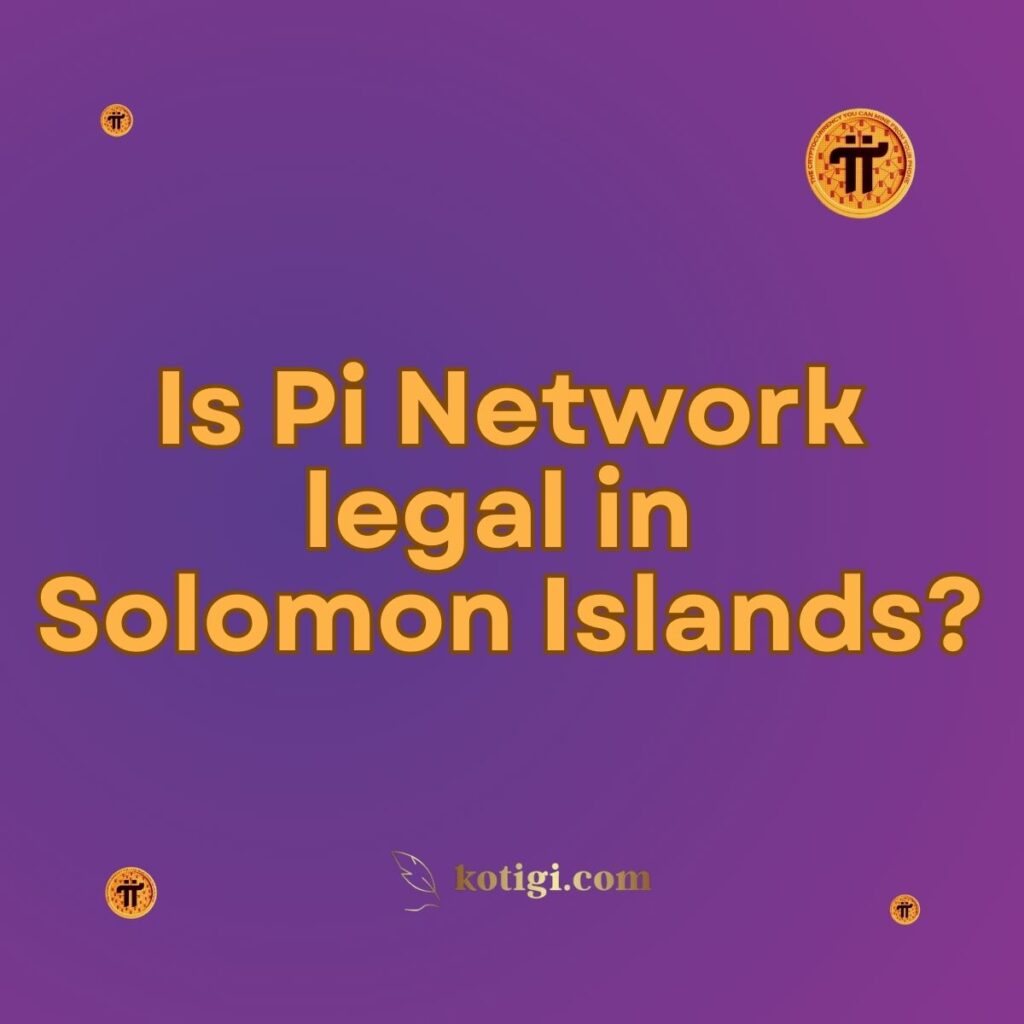
Is Pi Network legal in Solomon Islands?
Pi Network is currently legal in the Solomon Islands. There are no specific regulations prohibiting the use or mining of Pi tokens or any cryptocurrencies in the country. However, as cryptocurrencies continue to develop globally, residents of the Solomon Islands should keep an eye on any potential changes to local regulations concerning digital assets.
Introduction
The rise of cryptocurrencies, including Pi Network, has raised questions about their legality in different countries. For users in the Solomon Islands, it’s essential to know the legal framework surrounding Pi Network and other digital currencies. This article explores the current status of Pi Network in the Solomon Islands, discusses the general approach to cryptocurrency regulation in the country, and provides insights into potential future developments that could impact Pi users.
1. Cryptocurrency Regulations in the Solomon Islands
1.1 Current Legal Framework
The Solomon Islands currently does not have any specific regulations governing cryptocurrencies, including Pi Network. This lack of formal legislation means that individuals in the Solomon Islands can legally use Pi Network without restrictions. However, the government has yet to establish a comprehensive legal framework that addresses the growing trend of digital assets and blockchain technology.
1.2 General Approach to Cryptocurrency
Much like other developing nations, the Solomon Islands has been relatively quiet in addressing cryptocurrencies. While there are no laws prohibiting their use, there are also no protective regulations in place for users. This legal ambiguity allows for the operation of cryptocurrency platforms like Pi Network but does not offer any guidance on how the government will handle these digital currencies in the future.
1.3 Potential for Future Regulations
As cryptocurrencies gain global prominence, it’s possible that the Solomon Islands will eventually adopt more formal regulatory measures to govern their use. This could include taxation policies, security standards, and consumer protections, as well as the enforcement of anti-money laundering (AML) and counter-terrorism financing (CTF) regulations. For now, users can participate in Pi Network without concern, but they should stay updated on any legal changes.
2. Legal Status of Pi Network in the Solomon Islands
2.1 No Legal Restrictions on Pi Network
Pi Network is currently legal in the Solomon Islands. Users can mine Pi tokens and engage with the platform without fear of legal consequences. Since Pi tokens are still in their pre-market phase and not considered a tradable financial asset, they do not fall under any existing financial regulations.
2.2 Potential Impact of International Standards
Although there are no local laws addressing Pi Network or cryptocurrencies specifically, the Solomon Islands may align itself with international cryptocurrency standards over time. Should global regulatory bodies push for more stringent controls over digital currencies, the country could introduce measures that impact how Pi Network operates within its jurisdiction. This could include KYC and AML requirements or the imposition of taxes on cryptocurrency transactions.
3. Financial Considerations for Pi Network Users in the Solomon Islands
3.1 Tax Implications
At present, there are no tax regulations that apply to cryptocurrency earnings or transactions in the Solomon Islands. This includes any income generated from Pi Network mining, as Pi tokens are not yet recognized as having financial value. However, if Pi tokens eventually become tradeable, they may be subject to taxation under future policies related to digital assets.
3.2 Cryptocurrency Payments and VAT
If Pi tokens are accepted as a means of payment in the future, the Solomon Islands may choose to regulate how such transactions are taxed. This could include the application of Value Added Tax (VAT) or other levies on goods and services purchased with Pi tokens. While this is speculative, it is a consideration for users and merchants interested in the long-term use of cryptocurrencies within the country.
4. Risks and Challenges for Pi Network in the Solomon Islands
4.1 Regulatory Uncertainty
The lack of clear regulations surrounding Pi Network and cryptocurrencies in the Solomon Islands presents both opportunities and risks. While users can currently participate in the network without restrictions, the potential for future regulatory changes could alter the legal landscape. Governments worldwide are increasingly focused on regulating cryptocurrencies, and the Solomon Islands may follow suit, potentially imposing new rules on platforms like Pi Network.
4.2 Security Concerns
Although Pi Network has a secure infrastructure, users should always be cautious when engaging with any digital platform. In regions where regulatory frameworks are underdeveloped, there may be fewer consumer protections in case of security breaches or fraud. Users in the Solomon Islands should take steps to secure their personal information and follow best practices for safeguarding their accounts.
4.3 Possible Compliance with International Regulations
As global standards for cryptocurrencies continue to evolve, the Solomon Islands may face pressure to comply with international regulations regarding digital currencies. This could include stricter rules for verifying user identities (KYC) and monitoring transactions to prevent illegal activities like money laundering. Such developments could introduce new requirements for Pi Network users in the country.
5. Opportunities for Pi Network Users in the Solomon Islands
5.1 Early Adoption and Growth
By participating in Pi Network during its early stages, users in the Solomon Islands have the opportunity to accumulate Pi tokens before they are traded on the open market. Early adopters can benefit from potential future value appreciation if Pi becomes a widely accepted cryptocurrency. This makes Pi Network an attractive option for individuals interested in exploring the world of digital currencies.
5.2 Benefits for Local Businesses
If Pi Network continues to grow and its tokens become more widely accepted, local businesses in the Solomon Islands could consider adopting Pi as a form of payment. This would provide merchants with an additional means of conducting transactions and give consumers more flexibility in how they pay for goods and services.
5.3 Development of Blockchain Skills
As Pi Network encourages user participation in securing and expanding the network, individuals in the Solomon Islands can develop valuable blockchain skills. By engaging with Pi’s ecosystem, users can gain insights into blockchain technology, digital assets, and decentralized finance, positioning themselves for future opportunities in the expanding world of digital currencies.
6. The Future of Pi Network in the Solomon Islands
6.1 Potential Regulatory Changes
Although Pi Network is currently legal in the Solomon Islands, the government may introduce new regulations as cryptocurrencies continue to grow in prominence. Future rules could affect how Pi tokens are mined, traded, or used for payments. Users should stay informed about any potential changes to ensure they remain compliant with local laws.
6.2 Adoption of Pi Tokens in the Economy
As Pi Network matures, there is potential for its tokens to become a recognized form of payment in the Solomon Islands. This could lead to the integration of Pi into the broader economy, allowing consumers and businesses to engage with cryptocurrencies more frequently. For this to happen, the government would need to establish clear guidelines for how digital currencies are to be treated within the country’s financial system.
6.3 Long-Term Viability of Pi Network
The success of Pi Network in the Solomon Islands depends on the platform’s ability to deliver on its promises and gain global recognition. If Pi tokens achieve widespread acceptance and the platform continues to prioritize security and decentralization, Pi Network could become a viable cryptocurrency within the Solomon Islands’ digital economy.
Conclusion
Pi Network is currently legal in the Solomon Islands, offering users the opportunity to participate in the growing world of cryptocurrencies without regulatory restrictions. However, the country’s lack of specific laws governing digital currencies means that the legal status of Pi Network could change in the future. Users should stay informed about potential regulatory developments and take steps to ensure their continued compliance with any new laws.
Key Takeaways
- Pi Network is legal in the Solomon Islands, with no current restrictions on its use or mining.
- The country lacks specific cryptocurrency regulations, but this may change as the global regulatory environment evolves.
- No tax obligations currently apply to Pi Network users, but future regulations could introduce taxes on cryptocurrency transactions or earnings.
- Users should be aware of the potential for future regulatory changes, which could impact their ability to participate in Pi Network.
- Pi Network presents opportunities for early adopters in the Solomon Islands, as well as potential benefits for local businesses and developers.





